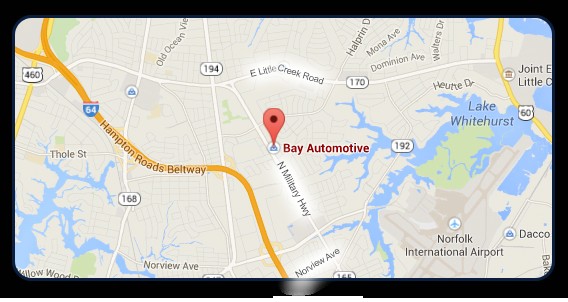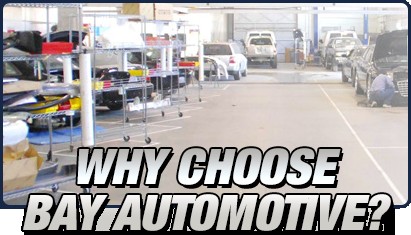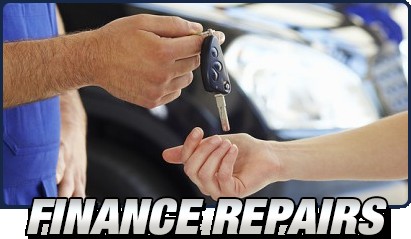Bay’s Auto Repair & Collision Services offers a comprehensive solution for individuals seeking to advance their career in the automotive industry, AUTO-REPAIR-TRAINING.EDU.VN serves as a central resource. From entry-level mechanic training to advanced collision repair techniques, and invaluable business insights for aspiring shop owners, Bay’s Auto Repair & Collision Services prepares you for success. Explore ASE certification, business plan creation, and step-by-step garage setup guides.
Contents
- 1. Discover Bay’s Auto Repair & Collision Services Locations
- 1.1. Norfolk Airport Location
- 1.2. 850 West 40th Location
- 2. Comprehensive Mechanical Repair Services
- 2.1. Official Virginia State Inspection Station
- 2.2. Extensive Service Offerings
- 2.3. Servicing All Makes and Models
- 2.4. AAA Approved for Quality Assurance
- 2.5. Financing Options for Repairs
- 3. Understanding Your Needs: Career Paths and Business Ventures
- 3.1. Who is this Information For?
- 3.2. Common Challenges
- 3.3. What Customers Need
- 4. Training and Education in Auto Repair
- 4.1. Exploring Vocational Schools
- 4.2. Online Auto Repair Courses
- 4.3. Securing ASE Certification
- 4.4. Apprenticeship Programs
- 4.5. Building Foundational Skills
- 5. Essential Steps to Open Your Own Auto Repair Shop
- 5.1. Developing a Business Plan
- 5.2. Securing Funding
- 5.3. Choosing the Right Location
- 5.4. Obtaining Necessary Licenses and Permits
- 5.5. Equipping Your Shop
- 5.6. Marketing Your Business
- 5.7. Hiring and Managing Technicians
- 6. Detailed Checklist for Starting an Auto Repair Shop
- 6.1. Pre-Launch Checklist
- 6.2. Day-to-Day Operations Checklist
- 7. Understanding Auto Repair Terminology
- 7.1. Basic Terms
- 7.2. Diagnostic Terms
- 7.3. Business Terms
- 8. What is the Earning Potential in Auto Repair?
- 8.1. Salary Expectations
- 8.2. Factors Affecting Income
- 8.3. Shop Owner Income
- 9. Trends Shaping the Auto Repair Industry
- 9.1. Electric Vehicles (EVs)
- 9.2. Advanced Driver Assistance Systems (ADAS)
- 9.3. Digitalization
- 9.4. Sustainability
- 10. Understanding Google E-E-A-T and YMYL
- 10.1. E-E-A-T
- 10.2. YMYL
- 11. Frequently Asked Questions (FAQ)
- 11.1. How do I choose the right vocational school?
- 11.2. What are the costs associated with opening an auto repair shop?
- 11.3. How can I increase my earning potential as a technician?
- 11.4. What are common challenges faced by auto repair shop owners?
- 11.5. What certifications are most valuable in the auto repair industry?
- 11.6. How can I finance my auto repair training?
- 11.7. What marketing strategies are most effective for auto repair shops?
- 11.8. How do I stay updated with the latest automotive technology?
- 11.9. What are the legal requirements for operating an auto repair shop?
- 11.10. How can I ensure customer satisfaction?
- 12. Ready to Take the Next Step?
- 12.1. Get Expert Guidance
- 12.2. Contact Information
- 12.3. Take Action Today
1. Discover Bay’s Auto Repair & Collision Services Locations
Bay’s Auto Repair & Collision Services offers two convenient locations:
1.1. Norfolk Airport Location
You can find Bay’s Auto Repair near Norfolk Airport.
 Norfolk Airport map
Norfolk Airport map
1.2. 850 West 40th Location
The second location is at 850 West 40th.
 850 West 40th map
850 West 40th map
2. Comprehensive Mechanical Repair Services
Bay’s Auto Repair & Collision Services delivers a wide range of mechanical repair services to keep your vehicle running smoothly.
2.1. Official Virginia State Inspection Station
Do you need a Virginia State Inspection? As an official Virginia State Inspection Station with licensed State Inspectors, Bay Automotive can handle your annual inspection. Scheduling your inspection and an oil change at the same time can save you a visit.
2.2. Extensive Service Offerings
Bay’s Auto Repair aims to provide quality repairs using ASE-trained technicians and the latest equipment while ensuring excellent customer service. Whether it’s routine maintenance, brake repairs, engine diagnostics, tire rotations, or auto detailing, Bay’s is equipped to handle all your automotive needs. They also repair mufflers, perform tune-ups, top up fluids, and check batteries. Additionally, they offer inspections on your A/C and heating systems.
2.3. Servicing All Makes and Models
Bay’s Auto Repair & Collision Services proudly services and repairs all makes and models, ensuring comprehensive care for every vehicle.
 Why choose bay automotive
Why choose bay automotive
Consider these benefits:
- Locally owned and operated for 76 years
- Convenient reservations or drive-in service
- Guaranteed repairs
- Affordable
- All work is completed by trained and certified technicians
- Friendly, well-trained estimators
2.4. AAA Approved for Quality Assurance
Are you looking for a certified repair shop? Being inspected and certified by AAA, Bay’s Auto Repair meets high standards.
 aaa approved
aaa approved
This includes:
- Facility approval
- Staff qualifications and training approval
- Tools and equipment approval
2.5. Financing Options for Repairs
Do you need help financing your car repairs? Bay’s Auto Repair offers financing options to ease the burden.
 finance repairs
finance repairs
Features include:
- A quick and easy application process
- Financing options available through our Service Advisor
- No interest for up to 6 months
- Special options for Military members
3. Understanding Your Needs: Career Paths and Business Ventures
Let’s address some challenges and needs faced by those interested in the auto repair industry.
3.1. Who is this Information For?
The audience includes:
- Gender: Primarily male (85-90%), with a growing segment of female enthusiasts (10-15%).
- Age: 16-60 years old, divided into key groups:
- Students (16-25): Exploring auto repair careers and training options.
- Career changers (25-45): Seeking vocational training for a new career.
- Automotive technicians (20-55): Upgrading skills and seeking certifications.
- Aspiring entrepreneurs (30-60): Planning to open their own auto repair shops.
- Occupation: Students, manual laborers, technicians, and potential shop owners/managers.
- Income: Entry-level technicians with potential for growth, and variable income for shop owners.
- Marital Status: Diverse.
- Location: United States, especially areas with high demand for auto repair services.
3.2. Common Challenges
Customers often face challenges such as:
- Finding reliable information on training programs.
- Managing training costs and initial investments.
- Lacking clear career guidance in the automotive sector.
- Navigating the complexities of opening an auto repair shop.
- Acquiring business management and marketing skills.
3.3. What Customers Need
Customers require services and information to help them:
- Understand the auto repair industry and career paths.
- Compare training programs (online, in-person, certifications).
- Master auto repair skills from basic to advanced levels.
- Grasp the process of opening and running an auto repair shop.
- Access practical guides and advice for starting a business.
4. Training and Education in Auto Repair
Embarking on a career in auto repair necessitates comprehensive training and education. AUTO-REPAIR-TRAINING.EDU.VN offers resources to guide you through this journey.
4.1. Exploring Vocational Schools
Are you considering vocational training? Vocational schools offer hands-on experience and technical skills necessary for success in the auto repair industry. These programs often include:
- Curriculum: Engine repair, electrical systems, diagnostics, and more.
- Duration: Programs range from several months to two years.
- Benefits: Direct entry into the workforce, potential apprenticeships.
4.2. Online Auto Repair Courses
Would you prefer to learn at your own pace? Online auto repair courses provide flexibility and convenience, covering a wide array of topics.
- Content: Video tutorials, interactive modules, and virtual labs.
- Cost: Varies from free to several hundred dollars per course.
- Advantages: Learn from home, supplement traditional training.
4.3. Securing ASE Certification
How important is ASE certification? ASE (Automotive Service Excellence) certification is a widely recognized standard in the auto repair industry.
- Requirements: Pass an ASE exam and have relevant work experience.
- Benefits: Enhanced credibility, higher earning potential.
- Preparation: Study guides, practice tests, and training courses.
4.4. Apprenticeship Programs
Should you consider an apprenticeship? Apprenticeship programs combine on-the-job training with classroom instruction.
- Structure: Work under the supervision of experienced technicians.
- Duration: Typically lasts 2-4 years.
- Advantages: Earn while you learn, gain practical experience.
4.5. Building Foundational Skills
What basic skills are essential? Foundational skills include understanding automotive systems, using diagnostic tools, and performing basic repairs.
- Key Areas: Engine mechanics, electrical systems, brakes, and transmissions.
- Resources: Textbooks, online tutorials, and hands-on workshops.
- Importance: Provides a solid base for advanced training.
5. Essential Steps to Open Your Own Auto Repair Shop
Opening your own auto repair shop requires careful planning and execution. AUTO-REPAIR-TRAINING.EDU.VN provides a detailed guide to help you navigate each step.
5.1. Developing a Business Plan
Why is a business plan essential? A business plan is crucial for outlining your business goals and strategies.
- Key Components: Executive summary, market analysis, financial projections.
- Purpose: Attract investors, secure funding, guide decision-making.
- Resources: Templates, sample plans, and business advisors.
5.2. Securing Funding
What funding options are available? Funding options include:
- Small Business Loans: Offered by banks and credit unions.
- Grants: Government and private grants for small businesses.
- Personal Savings: Investing your own money into the business.
5.3. Choosing the Right Location
How important is location? The location of your auto repair shop significantly impacts its success.
- Factors to Consider: Visibility, accessibility, demographics.
- Ideal Locations: High-traffic areas, industrial zones.
- Zoning Laws: Ensure compliance with local regulations.
5.4. Obtaining Necessary Licenses and Permits
What legal requirements must you meet? You must obtain the necessary licenses and permits to operate legally.
- Types of Licenses: Business license, auto repair license.
- Permits: Environmental permits, building permits.
- Compliance: Adhere to federal, state, and local regulations.
5.5. Equipping Your Shop
What equipment is essential? Essential equipment includes:
- Diagnostic Tools: Scanners, multimeters, and oscilloscopes.
- Lifts: Hydraulic lifts for vehicle maintenance.
- Hand Tools: Wrenches, sockets, and screwdrivers.
5.6. Marketing Your Business
How will you attract customers? Effective marketing strategies include:
- Online Presence: Website, social media, and online advertising.
- Local Advertising: Flyers, local newspapers, and community events.
- Customer Referrals: Encourage word-of-mouth marketing.
5.7. Hiring and Managing Technicians
How do you find qualified staff? Hiring and managing skilled technicians is crucial for providing quality service.
- Recruitment: Online job boards, vocational schools, and industry events.
- Training: Ongoing training to keep technicians updated.
- Management: Effective scheduling, performance evaluations, and team building.
6. Detailed Checklist for Starting an Auto Repair Shop
6.1. Pre-Launch Checklist
| Task | Status | Notes |
|---|---|---|
| Develop a Business Plan | Complete | Include market analysis and financial projections. |
| Secure Funding | Complete | Explore loans, grants, and personal investment options. |
| Choose a Location | Complete | Consider visibility, accessibility, and zoning laws. |
| Obtain Licenses and Permits | Complete | Ensure compliance with local and federal regulations. |
| Purchase Equipment | Complete | Diagnostic tools, lifts, and hand tools. |
| Set Up Accounting System | Complete | Choose accounting software and set up financial tracking. |
| Establish Vendor Relationships | Complete | Negotiate terms with parts suppliers. |
| Develop a Marketing Strategy | Complete | Online presence, local advertising, and customer referrals. |
| Hire Key Personnel | Complete | Technicians, service advisors, and administrative staff. |
| Obtain Insurance Coverage | Complete | Liability, property, and workers’ compensation insurance. |
| Set Up Point of Sale (POS) System | Complete | For managing transactions and customer data. |
6.2. Day-to-Day Operations Checklist
| Task | Frequency | Notes |
|---|---|---|
| Monitor Inventory Levels | Daily | Ensure adequate stock of essential parts. |
| Manage Customer Appointments | Daily | Efficient scheduling to maximize shop utilization. |
| Ensure Quality Control | Daily | Conduct thorough inspections and quality checks. |
| Process Payments | Daily | Securely handle transactions and manage cash flow. |
| Maintain Shop Cleanliness | Daily | Create a safe and professional environment. |
| Update Financial Records | Weekly | Track income, expenses, and profitability. |
| Review Customer Feedback | Weekly | Address complaints and improve service quality. |
| Conduct Staff Meetings | Monthly | Discuss performance, updates, and training needs. |
| Review Marketing Performance | Monthly | Assess the effectiveness of marketing campaigns. |
| Comply with Safety Regulations | Regularly | Ensure compliance with OSHA and environmental regulations. |
7. Understanding Auto Repair Terminology
To succeed in the auto repair industry, it’s essential to understand key terminology.
7.1. Basic Terms
| Term | Definition |
|---|---|
| Engine | The heart of the vehicle, converting fuel into motion. |
| Transmission | Transfers power from the engine to the wheels. |
| Brakes | Systems used to slow down or stop the vehicle. |
| Suspension | Supports the vehicle and provides a smooth ride. |
| Electrical System | Includes the battery, alternator, and wiring. |
7.2. Diagnostic Terms
| Term | Definition |
|---|---|
| OBD-II | On-Board Diagnostics, a system that monitors vehicle performance. |
| DTC | Diagnostic Trouble Code, a code indicating a problem. |
| Scan Tool | A device used to read diagnostic codes. |
| Multimeter | A tool used to measure voltage, current, and resistance. |
7.3. Business Terms
| Term | Definition |
|---|---|
| Profit Margin | The percentage of revenue remaining after deducting costs. |
| ROI | Return on Investment, a measure of the profitability of an investment. |
| Cash Flow | The movement of money in and out of the business. |
| Break-Even Point | The point at which total revenue equals total costs. |
| Customer Acquisition Cost | The cost of acquiring a new customer. |
8. What is the Earning Potential in Auto Repair?
The earning potential in auto repair varies based on experience, certifications, and location.
8.1. Salary Expectations
According to the U.S. Bureau of Labor Statistics, the median annual wage for automotive service technicians and mechanics was $46,830 in May 2021. The highest 10 percent earned more than $78,000.
8.2. Factors Affecting Income
- Experience: More experience typically leads to higher wages.
- Certifications: ASE certifications can increase earning potential.
- Location: Pay rates vary by state and city.
- Type of Employer: Dealerships, independent shops, and specialty shops offer different pay scales.
8.3. Shop Owner Income
Shop owner income varies widely based on the size, location, and management of the business. Successful shop owners can earn well above the median salary for technicians.
9. Trends Shaping the Auto Repair Industry
Staying updated with industry trends is essential for success.
9.1. Electric Vehicles (EVs)
The rise of EVs requires technicians to learn new skills related to battery technology, electric motors, and charging systems.
9.2. Advanced Driver Assistance Systems (ADAS)
ADAS technologies, such as lane departure warning and automatic emergency braking, require specialized knowledge for repair and calibration.
9.3. Digitalization
Digitalization includes online appointment scheduling, digital inspections, and customer relationship management (CRM) systems.
9.4. Sustainability
Sustainability practices, such as using eco-friendly products and recycling materials, are becoming increasingly important.
10. Understanding Google E-E-A-T and YMYL
To ensure your content is trustworthy and ranks well on Google, it’s important to understand E-E-A-T (Experience, Expertise, Authoritativeness, and Trustworthiness) and YMYL (Your Money or Your Life).
10.1. E-E-A-T
- Experience: Demonstrating real-world experience in auto repair.
- Expertise: Providing knowledgeable and accurate information.
- Authoritativeness: Being recognized as a reliable source of information.
- Trustworthiness: Ensuring content is honest, transparent, and accurate.
10.2. YMYL
YMYL topics, such as financial and medical advice, require a higher level of scrutiny. Ensure all information is accurate, up-to-date, and supported by credible sources.
11. Frequently Asked Questions (FAQ)
11.1. How do I choose the right vocational school?
Research schools, review their curriculum, and visit their facilities. Consider the instructors’ qualifications and the school’s job placement rates.
11.2. What are the costs associated with opening an auto repair shop?
Costs include equipment, rent, licenses, insurance, and initial inventory. Develop a detailed budget to estimate expenses.
11.3. How can I increase my earning potential as a technician?
Obtain ASE certifications, specialize in high-demand areas (e.g., EV repair), and continuously update your skills.
11.4. What are common challenges faced by auto repair shop owners?
Challenges include managing cash flow, attracting and retaining customers, and staying updated with industry trends.
11.5. What certifications are most valuable in the auto repair industry?
ASE certifications are highly valued and demonstrate competence in specific areas of auto repair.
11.6. How can I finance my auto repair training?
Explore scholarships, grants, and student loans. Some employers also offer tuition reimbursement programs.
11.7. What marketing strategies are most effective for auto repair shops?
Online marketing, local advertising, customer referrals, and community involvement are effective strategies.
11.8. How do I stay updated with the latest automotive technology?
Attend industry conferences, take online courses, and subscribe to automotive publications.
11.9. What are the legal requirements for operating an auto repair shop?
Requirements include business licenses, auto repair licenses, environmental permits, and compliance with safety regulations.
11.10. How can I ensure customer satisfaction?
Provide quality service, communicate effectively, address complaints promptly, and offer warranties on repairs.
12. Ready to Take the Next Step?
Are you ready to advance your career in the automotive industry or launch your own auto repair business? AUTO-REPAIR-TRAINING.EDU.VN is here to help.
12.1. Get Expert Guidance
Contact us today for personalized advice on training programs, business planning, and industry best practices. Our team of experts can provide the support and resources you need to succeed.
12.2. Contact Information
Reach out to us for more information:
- U.S. Office: 200 N Michigan Ave, Suite 1500, Chicago, IL 60601, United States
- WhatsApp: +1 (641) 206-8880
- Website: AUTO-REPAIR-TRAINING.EDU.VN
12.3. Take Action Today
Don’t wait to pursue your dreams. Contact AUTO-REPAIR-TRAINING.EDU.VN now and start your journey toward a successful career in the auto repair industry. Whether you’re looking to enhance your skills or open your own shop, we’re here to guide you every step of the way.